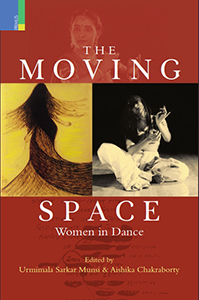
The Moving Space: Women in Dance
EDITOR- Urmimala Sarkar Munsi and Aishika Chakraborty
| HB ₹ 1395 . $64.95 . ₤52.95 |
||
INFORMATION
- EDITOR : Urmimala Sarkar Munsi and Aishika Chakraborty
- HB ISBN : 978-93-86552-50-1
- POD ISBN : 978-93-86552-51-8
- Year : 2017
- Extent : 288 pp.
- Discount available on checkout
- Usually dispatched within 3 to 5 working days.
The Moving Space
| HB ₹ 1395 . $ . ₤ |
PB ₹ . $ . ₤ |
|
| POD ₹ . $ . ₤ |
e-Book ₹ . $ . ₤ |
INFORMATION
- AUTHOR –
- ISBN – 978-93-86552-50-1
- Year – 2017
- Extent: 400 + 40 coloured illustrations
- 10% discount + free shipping
- Usually dispatched within 3 to 5 working days.
Aimed at addressing the lacunae in academic publications on women dancers in India, The Moving Space highlights the idea of the ‘space’ created, occupied and negotiated by women in Indian dance. It initiates a conversation between dance scholarship and women’s studies, and brings together scholars from a multidisciplinary background, emphasizing that research and practice have roots in both these specific areas. This book takes dance as a critical starting point, and endeavours to create an inclusive discourse around the female dancer and the historic, gendered and contested ‘space(s)’ that accommodate or are created by her. Highlighting the scope and necessity of using feminist theories in understanding complex relationships between individual experiences, gendered representation and cultural constructions in the realm of dance in India, it traces the lived experience of the dancer—her movements, her voice and her subjectivity. This collection of essays contextualizes women dancers from diverse historical and social milieu—from temple to courtyard, from silver screen to dance bars and from national to regional stages—within the larger rubric of dance studies, and brings out stories of survival, struggle, empowerment, subjugation and subversion.
The Editors
Urmimala Sarkar Munsi is Associate Professor, Theatre and Performance Studies, School of Arts and Aesthetics, Jawaharlal Nehru University, New Delhi.
Aishika Chakraborty is Associate Professor and former Director of the School of Women’s Studies, Jadavpur University, Kolkata.
Aimed at addressing the lacunae in academic publications on women dancers in India, The Moving Space highlights the idea of the ‘space’ created, occupied and negotiated by women in Indian dance. It initiates a conversation between dance scholarship and women’s studies, and brings together scholars from a multidisciplinary background, emphasizing that research and practice have roots in both these specific areas. This book takes dance as a critical starting point, and endeavours to create an inclusive discourse around the female dancer and the historic, gendered and contested ‘space(s)’ that accommodate or are created by her. Highlighting the scope and necessity of using feminist theories in understanding complex relationships between individual experiences, gendered representation and cultural constructions in the realm of dance in India, it traces the lived experience of the dancer—her movements, her voice and her subjectivity. This collection of essays contextualizes women dancers from diverse historical and social milieu—from temple to courtyard, from silver screen to dance bars and from national to regional stages—within the larger rubric of dance studies, and brings out stories of survival, struggle, empowerment, subjugation and subversion.
The Editors
Urmimala Sarkar Munsi is Associate Professor, Theatre and Performance Studies, School of Arts and Aesthetics, Jawaharlal Nehru University, New Delhi.
Aishika Chakraborty is Associate Professor and former Director of the School of Women’s Studies, Jadavpur University, Kolkata.
Table of Contents
Table of Contents
| Acknowledgements | ix-x |
| List Of Plates | xi-xii |
| Introduction Urmimala Sarkar Munsi And Aishika Chakraborty | 1 |
| Part I: Historicizing Spaces:Text And Context | |
|---|---|
| The Devadasi As An Archaic Historical Artefact: Culture And Nation In A Transitional Moment Uma Chakravarti | 21-47 |
| The Nayika And The Nautch Girl: The Courtesan In The Colonial Gaze Ratnabali Chatterjee | 48-64 |
| The Tawaif And The Item Girl: A Struggle For Identity Pallabi Chakravorty | 65-80 |
| The Queer Politics Of The Raj Anurima Banerji | 81-101 |
| Part Ii: Framed In Spaces: Presence And Representation | |
| Performance Sites/Sights: Framing The Women Dancers Urmimala Sarkar Munsi | 105-122 |
| Protesting Through Gestures: Maya Rao In Dialogue With Dance And Theatre Bishnupriya Dutt | 123-132 |
| Moving From The Temple To The Studio-Space: Transformation Of The Woman Dancer’s Labour In Films Priyanka Basu | 138-155 |
| Part III: Choreographing The Space: Identity And Creativity | |
| Writing Her Dance, Dancing Her Self: Auto-Choreographs From Bengal Aishika Chakraborty | 159-181 |
| Bharatanatyam And Butoh: An Emerging Gendered Conversation Through Site-Specific Dance In Chennai And Singapore Nirmala Seshadri | 182-197 |
| Chandralekha: Breaking Free To Counter The Nationalist Narrative In Dance Sadanand Menon | 198-214 |
| The Politics Of Space Samik Bandyopadhyay | 215-222 |
| Part Iv: Transformative Space: Empathy And Activismy | |
| Sitting In My Skin: Kathakali As The Transformative Space— An Interview Of Maya Krishna Rao Urmimala Sarkar Munsi | 226-232 |
| Moving With A Purpose: Women Dancers In Dialogue With Empowerment, Rehabilitation And Therapy Interviews With Sohini hakraborty, Alokananda Roy, And Lubna Marium By Aishika Chakraborty And Urmimala Sarkar Munsi |
238-263 |
| Notes On Editors And Contributors | 265-267 |
| Index | 269-276 |




